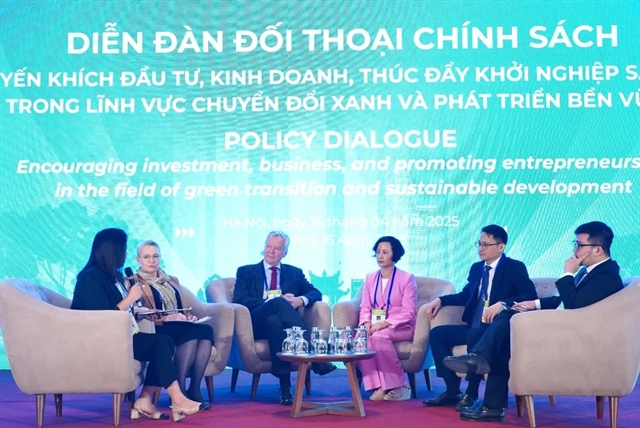Vietnamese start-ups are making important strides in developing green technology solutions to protect the environment and promote sustainable development.

HÀ NỘI — Domestic and international experts shared experiences and proposed solutions to foster cooperation in green innovation and sustainable development, at the Policy Dialogue Forum on encouraging investment, business and promoting entrepreneurship in the field of green transition and sustainable development, held on Wednesday.
The session was hosted by the Ministry of Science and Technology within the framework of the Partnership for Green Growth and the Global Goals 2030 (P4G) Summit in Việt Nam, taking place during April 14-17.
Addressing the event, the Executive Director of P4G, Robyn McGuckin, stated that since its establishment in 2018, the summit has supported early-stage start-ups, particularly in developing countries. In addition to providing technical and financial assistance, P4G also connects businesses with public-private partnership (PPP) mechanisms to help them overcome challenges related to capital, policy, human resources and more.
P4G focuses on solutions that mitigate the impacts of climate change in sectors such as energy, water and agriculture. Over the years, the P4G framework has mobilised US$42 million in capital to support PPPs, boosting investment in member countries.
In Việt Nam, McGuckin noted that since 2018, P4G has supported around 20 start-ups, operating in the fields of energy and water, with a focus on innovative technological solutions—particularly climate-smart approaches. These efforts have helped tackle issues related to clean energy, smart grids and rooftop solar energy. For example, EBOOST, a start-up providing intelligent charging solutions for all electric vehicle brands, has received P4G assistance and funding.
She affirmed that Việt Nam holds many advantages in developing technology and climate action. P4G fully supports Việt Nam’s green growth strategies across various sectors including economy, society, health and environment.
Sharing insights on start-up and innovation support, the Executive Director of Denmark’s State of Green, Finn Mortensen, said the Danish Government has restructured its business development programmes to focus on innovation hubs in energy, science and technology. Denmark also provides financial support to small and medium-sized enterprises, SMEs and has developed extensive advisory and support programmes for start-ups. Notably, Denmark runs initiatives involving company clusters across the country.
Currently, Denmark has six business development centres in major cities, dedicated to supporting SMEs and start-ups. These centres offer free consultation services for start-ups at various stages.
Mortensen added that Denmark was heavily dependent on fossil fuels in the 1970s and 80s, but by fostering new business models, the country is on track to achieve net zero by 2045, with key targets by 2030.
A key takeaway from Denmark’s experience is the importance of focusing on SMEs, so they can integrate into global partnerships, thereby enhancing ecosystems and securing leadership in green growth.
Mortensen said he has seen a strong spirit of innovation in Việt Nam, adding that they have many lessons and PPP models to share with Việt Nam and hope to strengthen cooperation
He believes that Việt Nam’s vibrant entrepreneurial and innovation spirit could inspire people in Denmark. His message to the P4G Summit 2025 is that Việt Nam and Denmark should deepen cooperation, especially in green sectors.
According to Phạm Hồng Quất, Director General of the Agency for Technology Entrepreneurship and Commercialisation Development under the Ministry of Science and Technology, Vietnamese start-ups are making important strides in developing green technology solutions to protect the environment and promote sustainable development.
In the context of innovation being driven to solve environmental and sustainability challenges, various sectors hold strong green growth potential within Việt Nam’s start-up ecosystem.
These include Green IT (developing software and energy management systems to optimise resource use), eco-friendly products (designing and producing environmentally friendly goods, from biodegradable packaging to energy-efficient household items); sustainable services (offering consultancy and solutions for sustainable development for businesses and communities); clean technology (researching and applying pollution-reducing technologies and efficient waste treatment methods); renewable energy (developing and deploying solar, wind, and biomass energy projects).
Highlighting some of the challenges green start-ups face, Quất pointed to difficulties in securing finance due to high upfront investment costs and long capital recovery periods. While the Vietnamese Government has issued several policies to support green transformation, specific regulations for start-ups remain underdeveloped.
Việt Nam also lacks a workforce with deep expertise in circular economy, carbon management and biobased production technologies. Market awareness remains another hurdle—although consumer interest in eco-friendly products is growing, price sensitivity and consumption habits are barriers.
To address these issues, Quất suggested conducting surveys and assessments to develop a comprehensive map of the green start-up ecosystem in Việt Nam. He also recommended developing a dedicated set of social-environmental-economic impact indicators for green tech start-ups, and promoting collaboration between universities, research institutes and enterprises in green technology development.
Moreover, he emphasised the importance of communication campaigns to promote green consumption, aiming to shift consumer behaviour towards the use of environmentally-friendly products.
Green innovation and start-ups are key to realising Việt Nam’s net zero commitment by 2050, the sci-tech official remarked.
As the body responsible for advising and implementing innovation support activities, the Agency for Technology Entrepreneurship and Commercialisation Development pledges to continue serving as a bridge between government agencies, businesses, investors, support organisations and international partners. The agency will also work to promote the development of flexible, practical policies aligned with green and sustainable development trends—particularly in this pivotal period. — VNS







